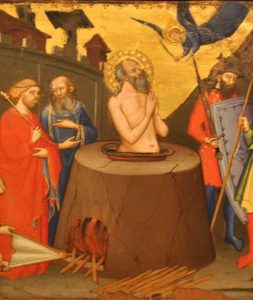Feast Day ~ May 6
Some of the feast days on the calendar of the Church represent events in the earthly life of our Lord (i.e. the Nativity, Presentation, Transfiguration, Resurrection, Ascension) or of the saints, such as the martyrdom of those who died for their faith (i.e. Ss. Peter & Paul on June 29) or the consecration of a bishop (i.e. St. Gregory the Great on September 3). The feast day of St. John Before the Latin Gate on May 6 is one of several feast days which celebrate a miracle.
St. John held a special place in the earthly life of our Lord. As the son of the fisherman Zebedee and Salome, the daughter of Joseph the Betrothed, John was Christ’s nephew, and he was called the “beloved disciple” for his especially close relationship to Christ. He was one of our Lord’s original twelve Apostles, thought to be the youngest, and he was one of those chosen to witness the Transfiguration. John was the only disciple who stood by the cross at the crucifixion and, as He hung on the cross, Jesus bade John take responsibility for his blessed mother. All the other Apostles received the crown of martyrdom after traveling to many parts of the world and preaching and teaching about the Savior, but John died a natural death in old age.
This does not mean that John didn’t live the same life of witness as the other Apostles. He preached mostly in Asia Minor, in and around the city of Ephesus, where he served as Bishop. The miracle that is celebrated on May 6 shows that John was willing to accept martyrdom like the other Apostles, but God had other plans for this beloved disciple.
During the fierce persecutions of Christians in the reign of the Emperor Domitian (81-96), the pagans of Ephesus who were enraged by the conversions of their countrymen through the teachings of John, sent him to Rome to appear before the Emperor. There, John was tortured in many violent ways but was strong in his refusal to denounce his Savior. As a final punishment, the Emperor had John placed in a cauldron of boiling oil at a place in front of the Latin gate, one of the gates in the southern part of the city wall. When the oil in the cauldron suddenly cooled so that John came out of it unscathed, the Emperor was frightened enough to end the tortures and instead to send John into exile.
Sent to the Greek island of Patmos in the Aegean Sea, John had time to reflect on Christ’s earthly life and ministry and he was given visions which he described in his book of Revelation, written during this time. When Domitian was assassinated and Nerva became emperor, many captives and those in exile were freed, so John returned to Ephesus where he wrote his Gospel and the three Epistles before his death at nearly 100 years of age.
Roman Christians did not forget the dramatic miracle of John’s surviving the cauldron of boiling oil and, in more favorable times, a church was built near this site and a feast day was established to be celebrated by the Church.
We give thanks for the courage of the Apostles and for the miraculous ways of God. May the memory of this miracle be a reminder to us that God still works miracles and that our eyes should be open to them.
Resources: The Anglican Breviary; The Liturgical Year, Vol. 8, by Abbot Gueranger; The Orthodox Study Bible; Prologue from Ochrid by St. Nikolai; Wikipedia article.
